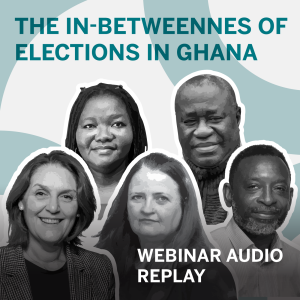

Webinar audio replay: Sustaining democracy and women’s political representation in Ghana - The ‘in-betweenness’ of elections
Ghana has been democratizing since the early 1990s. Citizen’s participation in the democratic processes at the national level is high. While Ghana’s democracy has chalked successes including the routinisation of elections and some level of democratic accountability, several weaknesses remain. Ghana has not moved beyond procedural democracy. Elections appear to be the most visible achievement in its three decades of practicing liberal democracy. Separation of power between the arms of government is problematic. Political and administrative decentralization is incomplete. Local level elections fail to excite citizens.
While the recent national election saw two firsts - the election of a woman vice-president and a focus on an affirmative action law, the impact is yet to be materialise. The underrepresentation of women in politics remains a bout on Ghana’s democracy, and within political parties, women are caged in specific positions such as women’s wings and women’s organisers. On this background this recorded webinar debates the following questions:
- Has the ‘liberal package’ of democratisation and gender equality delivered? And to which extent can we speak of ‘electoral fallacy’ in the case of Ghana?
- What are the drivers of women’s marginalisation in politics?
- Which institutions and actors work as change agents towards democratisation and women’s political representation in the in-betweenness of elections? How do they promote democratisation and women’s political representation?
- In which way can policy makers support processes of democratisation and gender equality?
🔗 More on gendered violence and electoral temporalities in Africa here
More Episodes
All Episodes>>Create Your Podcast In Minutes
- Full-featured podcast site
- Unlimited storage and bandwidth
- Comprehensive podcast stats
- Distribute to Apple Podcasts, Spotify, and more
- Make money with your podcast












